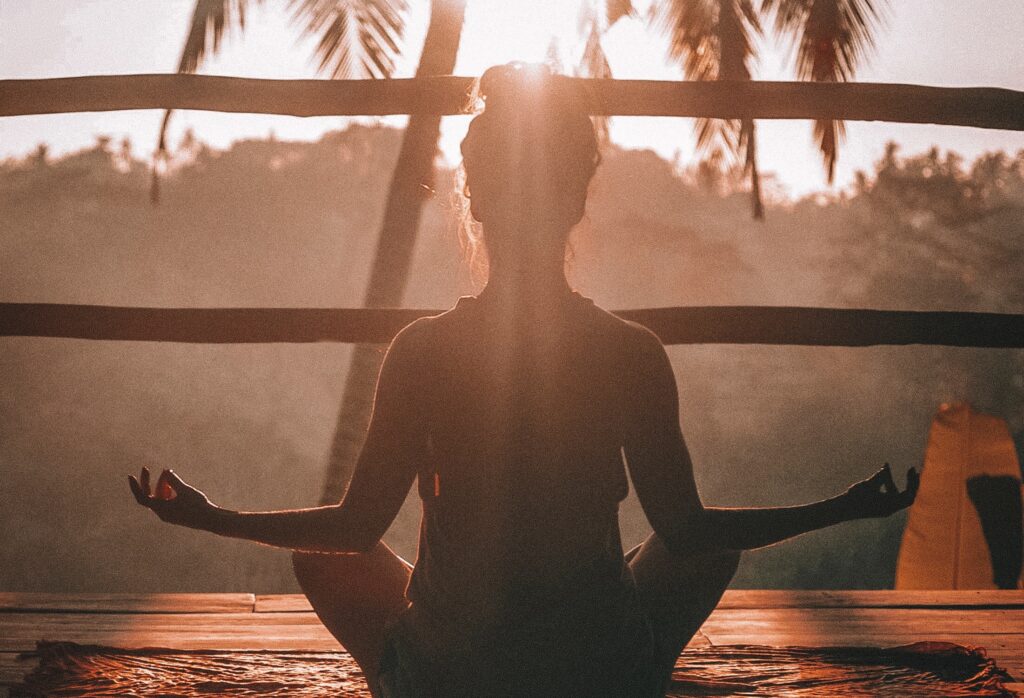You’ve heard of meditation’s remarkable benefits: increased mindfulness, reduced stress and inner serenity– and now, you’re ready to embark on your own journey of self-discovery and wellbeing. The idea of sitting alone with your thoughts may feel quite daunting, especially when you’re just starting out. In fact, the beginning of any transformative journey is often the most challenging.
Meditation is a simple yet profound practice. It’s a time-tested method for discovering inner tranquillity, honed and cherished by diverse communities across millennia. Meditation involves training your mind to embrace the present moment and gracefully release the clutter of distracting thoughts. The result? A profound sense of calm, clarity and centredness that can illuminate your path forward.
To guide you as you begin this age-old practice, our resident meditation expert Angelina Morino from The Haus of Health offers her invaluable insights to ensure your meditation journey is an approachable, rewarding and enlightening one.
You can also try a guided meditation session with Angelina in the JSHealth App!
Angelina’s top five tips for any beginners interested in meditation:
- Start small to create consistency
Begin with two minutes a day. Try that for a week, and see how you feel. Then increase your meditation by another two minutes each day, and practise that for another week. Increase by two more minutes for week three, continue this pattern and before you know it you’ll be meditating for 10 minutes, heck, maybe even more!
Meditation is a ‘practice’ and a skill and, by definition, the more we practise consistently, the more we increase our proficiency. Starting small means you’re more likely to stick with the practice.
Soulful Strategy #1
Your brain is a muscle, just like your quads and biceps. Think of your practice in the same way you would if you were preparing to train for a marathon and had never run before. The journey of a thousand miles begins with the first step (or in this case, the first sit!).
- Try to meditate just after you have woken up.
If you use your phone as an alarm, put it on airplane mode before you go to bed. This will help you resist the allure of checking emails and socials in the morning before your mind even has a moment to gather itself. Whether you’re a 9-5, a shift worker or somewhere in between, try to practise right after you have opened your eyes. Your mind may be a little more peaceful in this moment before the demands of life are realised.
Soulful Strategy #2
Label your alarm with ‘meditate’, or perhaps put a post-it note on your bedside table or fridge as a reminder.
- Don’t get stuck on the how – just do.
Life is noisy, and the perfect conditions for meditation don’t exist. It doesn’t matter where you meditate, as long as you feel safe and comfortable.
Soulful Strategy #3
Begin by sitting on a chair, or perhaps the sofa, your bed, or the floor if that’s comfy for you. You don’t even need to sit cross-legged! Just do what feels good and right for your body. To begin with, you’ll only be here for a short while and you can consider optimising your comfort once you start practising for longer.
- Meditating is not about emptying your mind.
One of the most prevalent misconceptions about meditation is that it is about emptying your mind, or stopping all thoughts. This is not the case at all!
Your brain is designed to think, it allows you to assess risks and keeps you safe. Whilst clearing the mind can sometimes occur in meditation, it’s not the “goal” of meditation. If you have thoughts running through your mind, that’s perfectly okay. We all do!
Soulful Strategy #4
Our brains love thinking, and it’s incredibly futile to try to shut them down. Instead, practise awareness of your mind wandering! Just notice what thoughts show up. Re-adjust your attention to your breath, and practice gently guiding your mind back to your breath whenever you notice it wandering off to plans, problems and to-do lists. It can all wait.
- Get comfortable with being uncomfortable.
People who are new to meditation — and even people who have been doing it for years — may experience emotions like anxiety, restlessness, and irritation whilst practising. Just like each day is different, each practice will also be different. We ARE human after all!
Soulful Strategy #5
Rather than trying to resist these emotions, give them your full attention and allow them to come and go. Just like the weather, these moments of annoyance will also pass. Over time the mind learns to witness these emotions but not get caught up in them — a skill that can be enormously beneficial not only during meditation but also in daily life.
Why is meditation so important, and what benefits can it bring to your life?
There is increasing evidence to prove that regular meditation practice (coupled with nutrition, movement and, where required, modern medication) as part of your routine can create the basis for optimal function of your mind, body and energy. There are loads of different styles of meditation, and, finding one that you resonate with, will help you enjoy your practice, and be consistent with it too.
During meditation we learn to observe what passes by without judgement, and we begin to learn how to stop being reactive to our thoughts. We train our brains to reduce the production of cortisol, our stress hormone.
With consistent practice, meditation has been shown to ease symptoms associated with stress, anxiety, physical pain, overeating, OCD, depression, negativity, high blood pressure and insomnia. Meditation brings present moment awareness to the situations that arise in your life, and with practice helps you expect the best is going to happen, instead of the worst.
With a necessity for technology in our lives, and the non-stop need to be ‘connected,’ our attention and focus is constantly compromised. Meditation allows us to find some space and, in turn, freedom. It gives us permission to slow down and switch to a mode of non-doing.
This gives our minds and bodies a vital break from all of life’s responsibilities, even if only for a few moments.
What would you say to anyone unsure about whether meditation is for them?
Are you a human? If the answer is yes, then I encourage you to give it a go. Start small. Two minutes.
If not, start even smaller. Take three deep breaths and soften your shoulders and face. There you go! You just did your first meditation!
Meet Angelina and try one of her guided meditations in the JSHealth App today!



